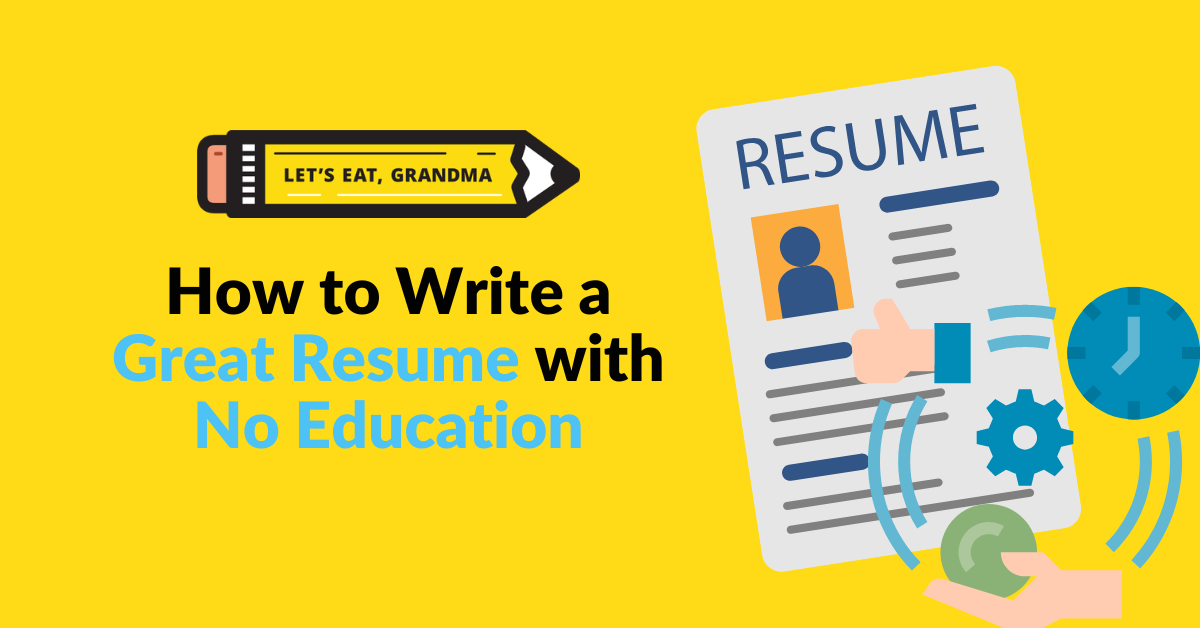How to Write a Great Resume With No Education (Or No Degree)

No degree on your resume? No problem! You can still write an impressive resume without including any formal education. Here’s how.
By: Reem Abouemera | Contributor for Let’s Eat, Grandma
If you’re wondering how to write a resume with no education or college degree, don’t worry! A lack of traditional education doesn’t have to be a death sentence for your job prospects. No matter what your educational background has been like, you can still craft an impressive resume.
All you need to do is focus on emphasizing your skills, accomplishments, and any other relevant experience you have. That way, you can still show employers that you’re a qualified candidate, even without a formal education.
Ready for more job search help?
Sign up for a free Senior Writer Resume Critique to see what's holding you back from landing interviews. One of our top professional resume writers will give you personalized feedback on the top 3 items you can improve based on our expert practices!
Here’s a guide on how to do exactly that:
6 Steps to Write a Resume with No Degree or Formal Education
1. Determine What Kind of Education You Can List

It’s still recommended to put unfinished or in-progress educational experiences on your resume, if they’re relevant to the job description. Photo by javier trueba on Unsplash
Sometimes, people think they can’t list any education on their resume if they don’t have a completed college degree. However, that’s not true! There are still a few items you can list in your Education section, even if you don’t have a degree yet.
For example, if you took some college courses but didn’t finish your degree, you can include that experience here. Just be sure to include how many credits you completed, as well as the name and location of the school. For example,
Coursework completed toward Bachelor of Arts in Business Administration
or
Bachelor of Arts in Business Administration, 120 credits completed
Alternatively, if you’re in the process of getting a degree, you can specify that too. Just include the degree type and your expected graduation date. For example:
Bachelor of Arts in Business Administration, expected May 2023.
You can also list any professional development opportunities or certification courses you’ve taken related to your target job. These types of courses show that you’re dedicated to learning and self improvement, both of which are qualities employers value. They can also show you have key skills required for the position. You can list these in a section titled “Professional Development,” “Certifications,” or “Training.”
Pro Tip: It is a best practice not to list your high school diploma on your resume, even high school is the highest level of formal education you have completed.
2. Carefully Read the Job Posting

If you don’t have education on your resume, it’s important to scrutinize every job posting to make sure you meet the minimum qualifications. Photo by Vadim Bozhko on Unsplash
Next, take a close look at the job posting. This should always be your best friend, since you should be tailoring your resume to every job. In most cases, you will easily be able to find the education requirements for the role in the posting.
This step is important because it will give you a better idea of your qualifications for the job. For example, if the job posting says “Bachelor’s degree required,” you know you won’t be selected for an interview if you have no degree on your resume.
Of course, you could still try to get a referral to the job through your network, but it’s probably not worth applying without a referral since you don’t meet the minimum qualifications.
However, if the job posting only mentions “preferred qualifications” or states that a degree is “preferred but not required,” you may still be able to apply even with no education on your resume. And the posting may not even require a degree, which is great for you!
In those cases, you know you’ll need to put extra focus on your skills and experience, rather than your educational background. Doing so boosts your chances of getting your resume noticed and landing an interview.
3. Organize Your Resume Sections in the Right Way
If you’re writing a resume with no degree, it’s often best to put your Education section at the bottom. That way, you can focus on highlighting your more relevant experience and qualifications first without shedding too much light on the lack of formal education.
That said, you should never try to fake your degree or hide the fact that you don’t have a degree. Doing so will give the wrong impression to employers and may even get your resume tossed in the virtual trash. This is why we generally advise against a “functional” resume format, which is designed to downplay employment gaps and other “red flags,” is a major no-no in this case.
4. Write a Powerful Summary Section
.Once you know what educational experiences you can list in your resume and where to include them, it’s time to start writing! The first section is your Summary of Qualifications, and it’s one of the most important parts of your resume if you have no education to list. Why? Because it’s the first thing employers will read, so you want to make sure it’s captivating and packs a punch.
When writing your summary section, always keep your target audience in mind. In this case, that means focusing on the skills and experience that will make you the best fit for the job.
For example, if you’re applying for a software engineering job but have no degree on your resume, you’ll want to focus on your knowledge of common coding languages and the projects and jobs where you’ve proved your skills.
Remember to keep things short and sweet (75-100 words for a standard summary and 100-175 words for an executive-level summary). The goal is to give employers a snapshot of your qualifications, not tell them your life story.
Pro Tip: If you’ve been using an objective statement on your resume, it’s time to ditch it! Objective statements are outdated and, in most cases, won’t do you any favors since they’re self-centered rather than employer-focused.
5. Emphasize Your Transferable Skills

It can be useful to highlight your transferable skills if you don’t have a completed degree on your resume. Photo by LinkedIn Sales Solutions on Unsplash
In your “Professional Experience” section, focus on the skills that are most transferable to the job you’re applying for. This is the one of the best things you can do to prove that you have the knowledge the job posting is asking for, even if you have no education to list on your resume.
Transferable skills are skills that you learn in one job and can be applied to another. So, for example, if you’re applying for a tech support job, but most of your experience is in retail sales, you can still highlight your customer service skills.
So even if you don’t have any formal education or direct experience in the field you’re applying for, you can still emphasize the skills you’ve acquired in other roles that will make you successful in this one.
Some examples of transferable skills include:
- Communication
- Teamwork
- Time management
- Organization
- Customer service
- Problem solving
But to avoid sounding like you’re just regurgitating a list of skills, focus on using bullet points with concrete examples and accomplishments to show that you’ve actually used and mastered these skills in your previous roles.
For example, rather than simply saying “excellent communication skills” in your Skills section you’ll alsowant to say something like, “Successfully resolved X number of customer complaints per month, with an average satisfaction rating of Y%.” This is the kind of hard evidence employers are looking for and is often more valuable to them than your education!
6. Leverage Your Cover Letter

Your cover letter is extra important if you don’t have formal education on your resume. Photo by Malte Helmhold on Unsplash
Cover letters are prime real estate for you to position yourself as the best candidate for the job, even if you have no degree to list on your resume.
In your cover letter, you can use your own voice to elaborate on your skills and experience in detail and give employers a better sense of who you are as a professional. Use specific stories to explain the lessons you’ve learned throughout your career and how they’ve made you the strong candidate you are today.
Remember, the goal is to show employers that you have what it takes to excel in the role, even if you don’t have a formal education. So take the time to sell yourself and let your personality shine through!
However, don’t apologize for or dwell on the fact that you don’t have a degree. This will only make you seem unsure of yourself and could damage your chances of landing the job. Instead, focus on the positive and let your qualifications speak for themselves.
Pro Tip: Your cover letter isn’t meant to be a rehashing of your resume. Instead, think of it as an opportunity to tell your professional story and fill in any gaps your resume might have.
The Takeaway: You Can Still Write a Great Resume with No Degree or Formal Education
While having a degree is a plus, it’s not always necessary to land the job you want. By following the tips above, you can write a great resume with no education or no degree and make yourself stand out from the competition!
All it takes is for you to really zoom in on what you bring to the table and present it in the most positive light possible.
So don’t let your lack of formal education hold you back—use it as an opportunity to show employers that you’re a unique candidate with a lot to offer!
Ready for more job search help?
Sign up for a free Senior Writer Resume Critique to see what's holding you back from landing interviews. One of our top professional resume writers will give you personalized feedback on the top 3 items you can improve based on our expert practices!
